In the past century, the increasing greenhouse effect and the decreasing of natural resources, the out-of-control carbon emissions or ecological crisis caused by economic development, uneven water resources or water pollution incidents, etc., have forced the world to face the issue of sustainable development. How to use green technology to improve the utilization and recovery rate of resources and energy and create a sustainable environment has become one of the most important issues of governments. National Taiwan University and the Massachusetts Institute of Technology held a joint online workshop on 10th March, inviting professionals from this field to publish their research results and exchange thoughts. Professor Pai-Chi Li, VP of Office of Research and Development, and Director of Industry Liaison Office, National Taiwan University said in his welcome remarks: “Research professionals have always played a key role in studying and responding to the challenges we are facing. We are very honored to have some of the top researchers from the Massachusetts Institute of Technology and National Taiwan University talk about cutting-edge green technologies. The topics we will discuss today, including water resources, especially seawater desalination, carbon emission control, the removal and management of carbon dioxide, and the key to maximizing renewable and waste resources, are important topics that will help shape the future of green technology.”

Photo 1: Group photo of NTU and MIT speakers
In the first half of the workshop, Dr. Jongyoon Han, Professor of the Department of Electrical Engineering and Computer Science, and Department of Biological Engineering from MIT discussed a few critical challenges in seawater desalination. As large-scale desalination plants are not adequate for resource-limited, sparsely populated regions of the world with limited water supply. Dr. Han’s group has built a prototype of a portable, small-scale desalination device based on novel scientific advances in electrical desalination processes. Other significant challenges of desalination plants are the proper management of waste brine. Dr. Han showcased a few promising engineering approaches to reduce the impact of the environmental release of brine rejects from desalination plants. Next, Dr. Betar Gallant, Associate Professor and the American Bureau of Shipping Career Development Professor in Mechanical Engineering from MIT highlighted some existing challenges with CO2 capture and the uncertain question of what to do with CO2 once captured. These challenges reveal opportunities to develop emerging concepts to make carbon capture less energy-intensive and the need for more versatile capture technologies to meet demands in varied sectors where carbon will need to be managed. Dr. Gallant described their research efforts developing a concept of integrated CO2 capture with direct electrochemical conversion, which shows potential to simplify the carbon management chain and lower critical energy penalties. Dr. Gallant also discussed the scientific and practical challenges of relevant technology and factors to consider when assessing how it might contribute to managing carbon at scale.
In the second half of the workshop, Dr. Chia-Hung Hou, Professor of Graduate Institute of Environmental Engineering from NTU discussed the capacitive deionization (CDI) technology for desalination, water reuse, and resource recovery. He pointed out that water treatment is not just about producing clean water. It is important to achieve this goal in a more energy-efficient and environmentally sustainable way. His research team also developed CDI technology with this thinking in mind, and applied it to desalination, water reuse, and capturing of valuable ions in water. CDI-related research literature has grown rapidly since 2010. NTU ranks second in the world in CDI literature publications, and Dr. Hou plays an important leading role in it. He introduced the development, application, and advantages of different types of CDI technologies, and showed how his research team used them to help developing countries solve the problems of energy and clean water deficiency, as well as the water resource problems faced by island countries under climate change. Next Dr. Wen-Yueh Yu, Associate Professor of the Department of Chemical Engineering from NTU talked about catalyst research and development, which is a key factor in upgrading renewable and waste resources. Catalysts are closely related to the technological development of green chemistry. The development of catalyst materials is also based on renewable resources and sustainable processes. The target is to develop catalysts that are atom-efficient, energy-efficient, cost-effective, carbon-neutral, and environment-friendly. Dr. Yu's research ranges from heterogeneous catalysis studies to surface science studies, with a current focus on the development and practical application of cost-effective catalysts. Currently, the industry mostly uses catalysts from abroad. But in recent years, Taiwan also hopes to design and produce catalysts locally. Dr. Yu's research team is expected to be one of the driving forces.
The workshop is honored to invite Dr. Kuo-Lun Tung, a Distinguished Professor of the Department of Chemical Engineering of NTU, as the moderator of the event. Dr. Tung has extensive experience in both research and entrepreneurship of water and carbon in the circular economy. With his rich professionalism and innovation, as well as practical experience in industry-academia collaboration. led the in-depth discussion after each speech, concluded the workshop with the following remarks: “Water and carbon are the most important issues in a green economy. The topics of our four speakers from the leading universities today are all very new technologies. I hope to use this opportunity to provide you with an understanding of forward-looking technologies, to think about their applicable fields, and to gain a head start in application development.” Green technologies have not only become the basis of thinking for global growth, but also the driving force of many economic developments. The workshop organizer, National Taiwan University Industry Liaison Office, hopes that this workshop would create more academic exchanges, and moreover, become a bridge for industry-academia collaboration, and brought innovative momentum into related industries after the successful conclusion of the event.